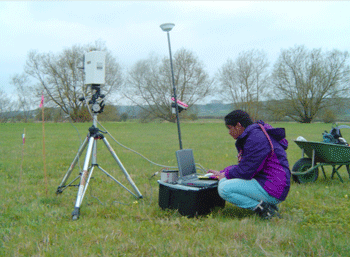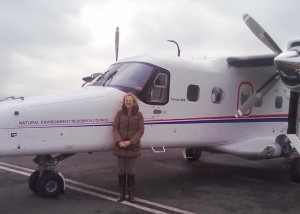
Erosion and deposition derived from before and after LiDAR images from the Cockermouth floods
Hannah Cloke has won a large NERC consortium grant as part of NERC’s Flooding From Intense Rainfall (FFIR) call entitled: ‘Susceptibility of catchments to INTense RAinfall and flooding – SINATRA’.
Extreme rainfall events may only last for a few hours at most, but can generate terrifying and destructive floods. Their impact can be affected by a wide range factors such as the location and intensity of the rainfall, the shape and steepness of the catchment it falls on, how much sediment is moved by the water and the vulnerability of the communities in the flood’s path. These events are by their nature rapid, making it very difficult for researchers to ‘capture’ measurements at the time. The complexity, speed and lack of field measurements make it difficult to create computer models to predict flooding.
NERC launched the FFIR research programme to reduce the risks from surface water and flash floods by improving our identification and prediction of the weather, flooding and sediment and debris moved by floods. A major requirement of the programme is identifying how particular catchments may be vulnerable to sudden flooding, due to factors such as catchment area, shape, geology and soil type as well as land-use.
Project SINATRA will address these issues in three stages:
- Increase our understanding of what factors cause FFIR
- Use this new understanding and data to improve models of FFIR so we can predict where they may happen nationwide
- Use these new findings and predictions to provide the Environment Agency and other professionals with information and software they can use to manage FFIR, reducing their damage and impact to communities.
Co-Investigators at Reading are Anne Verhoef (GES), David Mason and Richard Allan (Meteorology) and Sarah Dance (Maths and Statistics).
The other institutions in the consortium are Newcastle University, University of Bristol, King’s College London, University of Exeter, University of Hull and the British Geological Survey (BGS).
There has been severs flooding in Germany. Read about it in Spiegal online.
The European flood awareness system (EFAS) is designed to predict such floods on the medium range (15 days in advance) and its operational centre is situated in Reading. Hannah Cloke works closely with the EFAS team researching ways to improve flood forecasting.
Visit www.efas.eu.
Read about Hannah
 Professor Hannah Cloke and Dr Liz Stephens, in collaboration with the Walker Institute, are hosting an afternoon event to showcase the University’s work in developing and supporting flood forecasting capabilities globally. It is open to all University staff and students, plus participants from other organisations who are interested in flood forecasting.
Professor Hannah Cloke and Dr Liz Stephens, in collaboration with the Walker Institute, are hosting an afternoon event to showcase the University’s work in developing and supporting flood forecasting capabilities globally. It is open to all University staff and students, plus participants from other organisations who are interested in flood forecasting.




